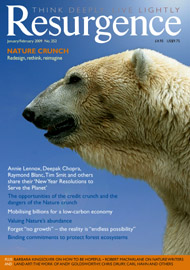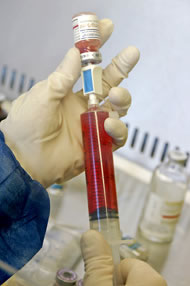THE TITLE’S WORDS ‘War on Cancer’ are ironic. Governments and charities have spent millions ostensibly ‘fighting cancer’. Yet Devra Davis, elegantly and very readably, reveals the lies, blindness and corruption which have made it largely a war of smoke and mirrors.
That may sound unlikely in view of the frequent announcements about wonder drugs. However, given a choice between being cured of cancer or never developing it, which of us would not choose the latter? And Davis shows how the causes of cancer – many of which damage both us and the
natural world – have largely been ignored, or deliberately concealed and denied, at the highest levels. For, although she is too subtle a writer to put it quite so baldly, causing, detecting or treating cancer is usually highly profitable, whereas preventing it is not.
She is not the first expert to suggest that. However, her great achievement is the way in which she takes us behind the scenes and uses real-life stories to put flesh on the bones of those facts. As a distinguished epidemiologist she bases this book on thirty years of looking, not just at cancer itself, but at the human, environmental, political, scientific and legal background to cancer’s causes. So she reveals the dirty underbellies of industry, politics, medicine and science, and the tragic human consequences of what is almost institutionalised dishonesty.
Both Davis’s parents died of cancer. And, although she writes gently, and without apparent anger, she has the courage to name names. From an American chemical company’s crucial aid to the Nazis before World War II, through the extraordinary medical support for tobacco companies, to Donald Rumsfeld’s role in obtaining approval for aspartame – the sweetener of much-questioned safety now in thousands of manufactured foods worldwide – she pulls no punches.
Her real-life stories reveal chemical companies failing to provide even the most basic protection for employees; young children knowingly being exposed to carcinogens because of laws too flabby – and pro-industry – to protect them; whole communities being polluted and condemned to cancer; and America’s top cancer society being “infiltrated by people who were determined that this organisation be a sleeping giant”.
Behind that Davis shows us a sorry tale of corrupted scientists and political chicanery. A betrayal of public trust which has allowed the sale and use of known carcinogens, enabled life-saving tests, such as one for cervical cancer, to be ignored or rubbished for decades, and still permits profitable cancer tests and treatments to be used worldwide even when they increase cancer. A situation created by such powerful ‘players’ that one top doctor told Davis she was afraid of being killed if she spoke out against such things.
Equally disturbingly – since they underpin all else – Davis shows that even science and the law have become distorted and corrupted. Indeed, her most valuable achievement is perhaps that she takes science off its pedestal as the modern god. For, as a scientist, she shows how science can be a casino in which the dice are loaded and research rigged to ‘prove’ that black is white. Moreover, far from guaranteeing accuracy, pre-publication ‘peer review’ by other scientists – who may be corrupt – can prevent the publication of honest research which might harm big
business.
Furthermore, having shown that Professor Richard Doll was far from being the only eminent scientist funded by the companies he should have been exposing, she makes a crucial point which is often overlooked. The greatest danger, she writes, is that corrupt research can “enter the scientific literature, become the received wisdom and be the basis for far-reaching political decisions which affect the lives of all of us”.
Davis also questions how scientific developments are used. She says, “We seldom know the extent to which vested interests have shaped and spurred the development of entire fields of scientific enquiry.” Though she does not say so, genetic engineering and nanotechnology are almost certainly two such fields. And both have the potential not only to foster cancer but to do incalculable environmental damage.
Finally, having been an expert witness on environmental hazards, she takes the law off its traditional pedestal. For she says that, when employees or neighbours of chemical plants claim compensation for cancer caused by pollution, the courts are “allowing the absence of [scientific] proof of human harm to be construed as evidence that there is no such harm”. And doing so even when the circumstantial evidence is clear, as “scientific uncertainty is easier to purvey than most of us ever dreamed.”
Words which are, perhaps, kinder than those involved deserve. For it is surely not merely the purveyance of uncertainty but the manufacturing of uncertainty which bedevils justice worldwide on both medical and environmental issues, especially those related to the most money-spinning of all ailments: cancer. Moreover, Davis fails to point out the striking double-think whereby chemicals are tested on animals to, supposedly, establish their safety for human use, yet when chemicals harm animals in the environment, this is rejected as evidence that they may be harming us too. However, in general her balance and insight are as impressive as her skills as a writer.
It is, I suspect, no coincidence that this brave and compelling book is published as Davis nears the age of retirement. Revealing that the emperor has no clothes is not a role for someone seeking professional advancement. Her courage, wisdom, depth of knowledge and considerable skills as a writer make this a book that should be read by every doctor, MP, judge and environmental or medical decision-maker.
It deserves to be on the gift list of anyone who wants insights into the rise in cancer, the hidden wheels that drive our world, or the hapless state of much industry-financed science today. For understanding is the cornerstone of change and, as Davis says, “There’s got to be a better way to build our world than waiting for enough bodies to drop or sicken before we decide we’ve got a problem.”







